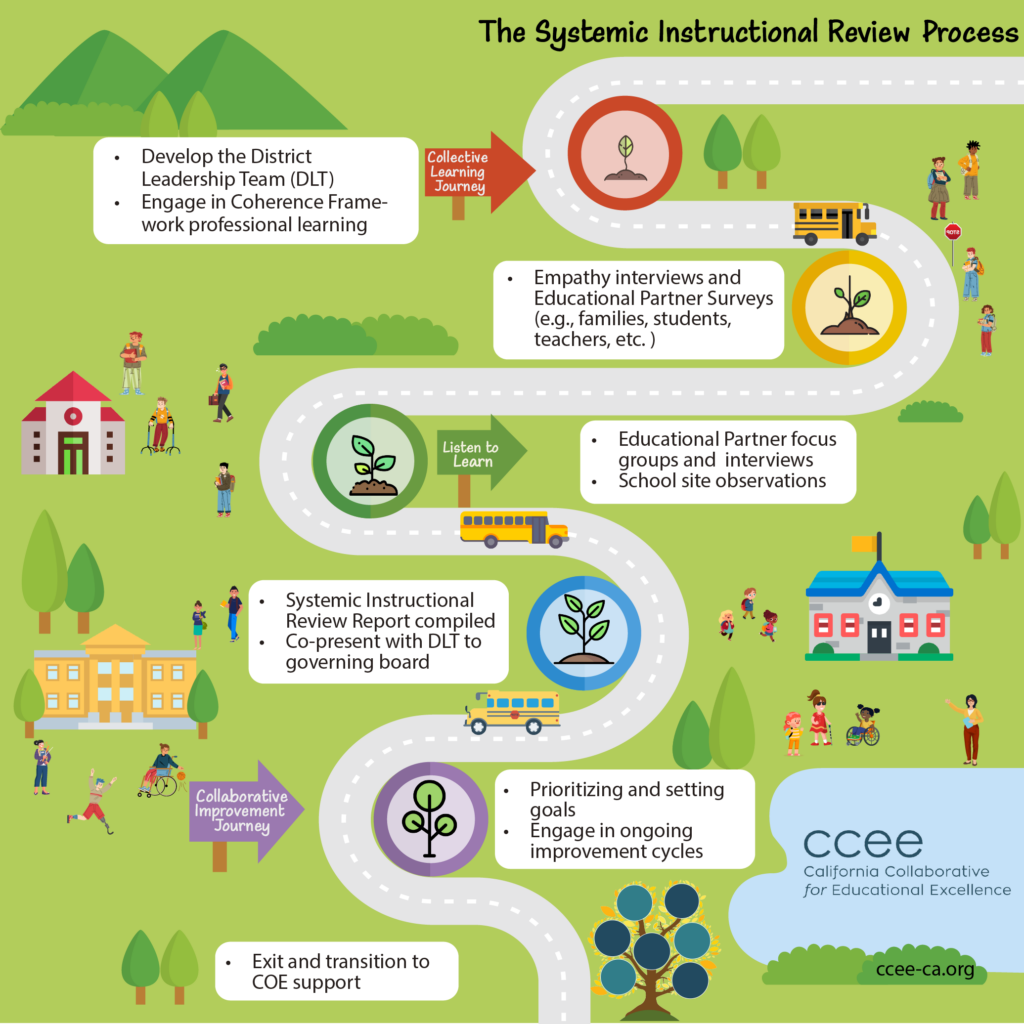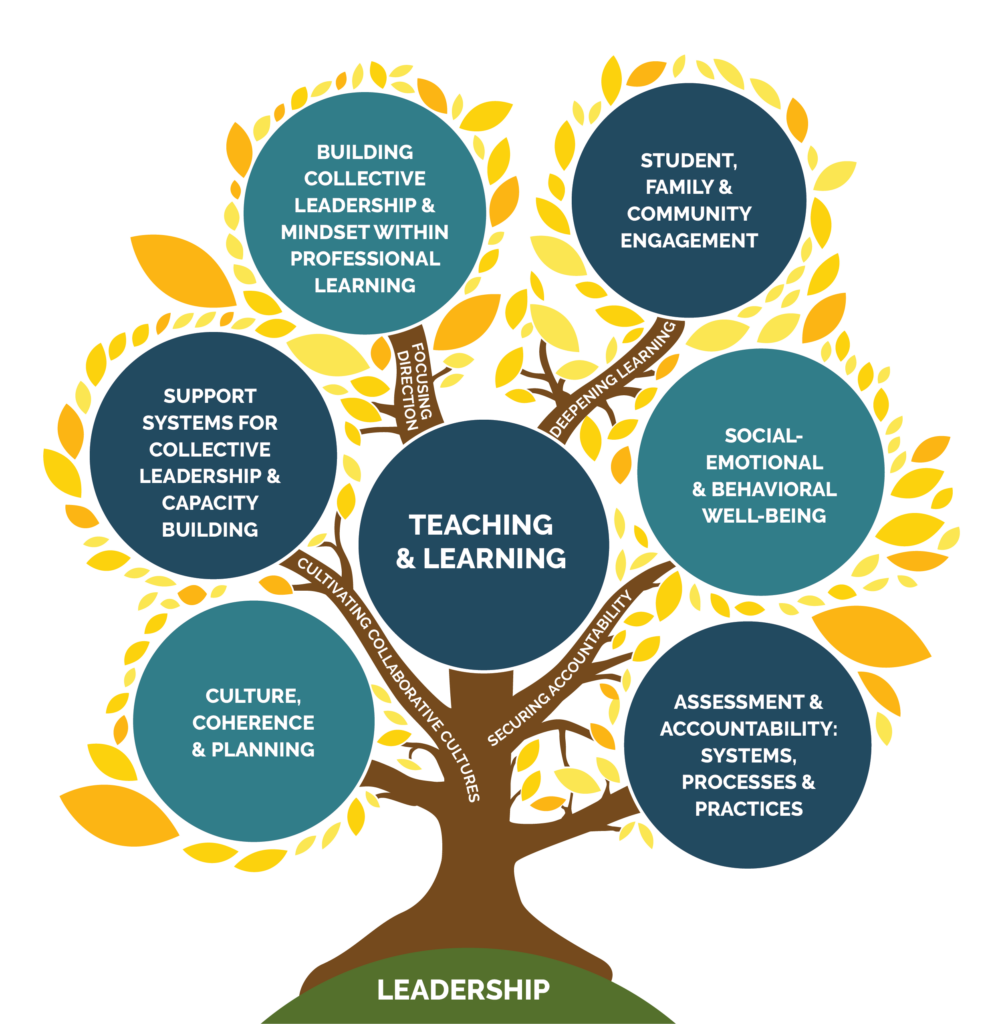Systemic Instructional Review
Why?
The SIR is one of the most intensive supports that may be provided as a part of CCEE’s Direct Technical Assistance to a district. The SIR process provides the district leadership with an analysis of their instructional systems. The SIR aims to identify what improvement strategies may help the LEA ensure that every student is making academic progress and social and emotional growth so they will be prepared to thrive as their best self.
How?
The SIR process is grounded in Fullan & Quinn’s Coherence Framework and quality improvement to focus direction, cultivate collaborative cultures, deepen learning, and secure accountability. The CCEE will engage with team from the LEA and COE to understand their needs and goals toward achieving student success and conduct various data gathering methods such as school visits, focus groups, instructional crosswalks, and more. After data collection and analysis, the CCEE will continue to work with the LEA and COE to develop and support the implementation and sustainability of the improvement work.

What?
The Systemic Instructional Review (SIR) is a Pre-K through 12 comprehensive analysis of the LEA’s instructional systems (academic and social emotional) and implementation of teaching, learning, and leading practices. Educational partners at multiple levels (students, families, teachers, school site staff and administration, governance members, and district office leadership, etc.) are involved throughout the data collection process.
SIR Framework and Instructional Components
The SIR Framework utilizes components adapted from New York State Education Department and Massachusetts Department of Elementary and Secondary Education review processes, as well as, Fullan & Quinn’s Coherence Framework.
The Coherence Framework and Instructional Components operate synergistically to provide a comprehensive lens for understanding and improving educational systems. The collaborative use of the Coherence Framework and Instructional Components facilitates a thorough analysis of local educational agency systems, structures, processes, and practices, fostering a cohesive and targeted approach to enhance educational outcomes.

- Does the LEA demonstrate a strong value on culture and climate for all educational partners that teach, promote, and create a mindset around inclusivity and diversity?
- Do LEA members implement culturally reflective practices and policies that are designed to create coherence around an inclusive instructional mission and vision achieved through continuous improvement practices and processes?
- Does the LEA have clear goals and utilize continuous improvement strategies to accomplish the goals?
- Is there alignment between the LEA’s major plans and the LEA’s Local Control and Accountability Plan (LCAP)?
Each participating school within the selected district, receives the following:
- Does the LEA have clarity on learning goals and the capacity to implement and maintain the pedagogical practices needed to achieve these goals?
- Does the LEA use instructional practices, strategies, and learning materials that are standards-aligned, culturally inclusive, rigorous, coherent, and differentiated to support the academic and social-emotional progress of all students?
- Do the instructional practices and strategies used by the LEA positively support students’ progress and growth?
- Intensive training–on targeted, research-based improvement strategies, using evidence-based instructional resources, strategies, and interventions, including the development of training materials by Solution Tree.
- Does the LEA help to build teachers’ capacity to implement and consistently refine proven pedagogical practices?
- Are the social-emotional and behavioral well-being of the whole child critical components in the LEA’s mission and vision?
- Are identified social-emotional and behavioral skills integrated into the curriculum, instructional practices, and resources for student support?
- Are social-emotional and behavioral health embedded in LEA policies and practices and modeled by adults?
- Does the LEA have a systemic process to use student data to support academic, behavior, and social-emotional learning for all students?
- Does the LEA use data to support accountability and continuous improvement?
- Does the LEA have a student information system that meets federal/state/local reporting requirements and supports the use of data for effective school-based planning?
- Does the LEA engage in practices that respect the cultural and linguistic needs of families and the community?
- Does the LEA provide resources and activities that give students agency and voice, promotes student leadership, and provides a space for active family and community engagement?
- Does the LEA use common language and have common understanding of teaching, learning and assessment expectations?
- Is the LEA focused on developing the capacity of all teachers and leaders in the system?
- Do leaders in the LEA participate as learners, help shape culture, build trusting relationships, make learning a priority, create opportunities, and provide resources for collaborative work?
- Does the LEA provide professional learning opportunities for staff to learn, practice, and receive feedback on pedagogical skills and data-driven decision-making, problem-solving and progress monitoring?
- Does the LEA have a professional learning plan that encourages learning partnerships, builds leadership capacity, and provides a safe environment for deep learning?
- Do data-based professional learning opportunities foster collective responsibility for improving student outcomes?
- Does the LEA have a consistent and high-functioning instructional leadership team that includes representation across grades, content areas, and student groups?
- Does the LEA use data to drive decisions and continuous improvement to support culturally responsive, evidenced-based instruction for all students according to their individual needs?
- Does the LEA have a collaborative culture that supports effective management and instructional leadership among district and site administrators?
- Does the LEA have organizational capacity and processes that ensure goals and metrics are mission and vision driven across departments and school sites?
- Does the LEA have intentional and on-going capacity to ensure that leaders are supported and can fulfill their roles and responsibilities?
To view our references, click here
SIR Reports
For the latest updates on the work with our partners visit: Direct Technical Assistance